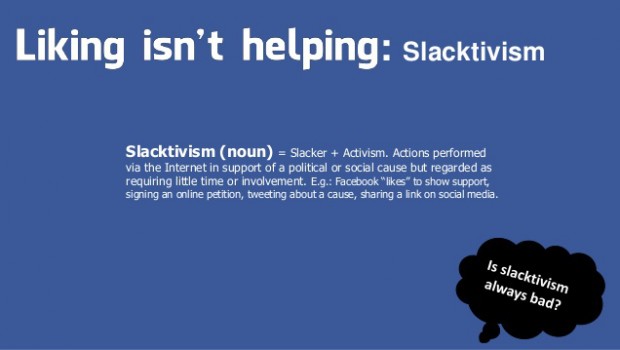
By Kristen Harris
Every single time that I scroll through Facebook or Twitter or Instagram (which, let’s be real, is a lot), it seems to me that yet another person is jumping onto the proverbial protestorial bandwagon.
My friends and followers love to post about how unconstitutional or unbiblical this act or that belief is. Rants longer than Anna Karenina clog up my feed when, really, I just wanted to see a few videos of puppies playing with babies.
During a conversation concerning this very topic, my sister introduced me to the term “slacktivism.”
A quick Google search defined this term as “actions performed via the Internet in support of a political or social cause but regarded as requiring little time or involvement, e.g., signing an online petition or joining a campaign group on a social media website.”
Though it’s only February, I feel as if “slacktivism” could already be named the word of the year. I mean, if it wasn’t for that long Facebook status you made about Trump’s Muslim ban, then how would the Supreme Court Justices know that they should rule it unconstitutional?
If you didn’t quite catch my sarcasm there, then I’ll say it one more time for the people in the back: your slacktivism isn’t doing any good at all.
Let’s take it all the way back to 1965. Three Illinois students were pretty fed up with the Vietnam War and all of the deaths it was causing. So, in protest, they wore black armbands to school. They got suspended for it, so, naturally, they took their case all the way up to the Supreme Court.
In 1969, the Court ruled in favor of the students in Tinker v. Des Moines, stating that the students did not lose their free speech rights “at the schoolhouse gate.”
However, while Tinker v. Des Moines was a huge win for free speech, what did it do for the Vietnam War? Why, absolutely nothing, of course.
The case that changed the tide of the Vietnam War was New York Times v. US, which was the infamous Pentagon Papers case.
Basically, a man who worked for the Pentagon found out what the federal government had been keeping from the public about the American involvement in Vietnam.
Lucky for Ellsberg, the Pentagon had all the information put into a few-thousand-page report, which he proceeded to make copies of. Ellsberg eventually turned the papers over to the New York Times for publication, and the government’s panicked reaction helped change public opinion on the Vietnam War.
The case was argued in 1971, Nixon resigned after Watergate in 1972, and the US officially withdrew from Vietnam in 1975.
Now, I am most definitely not saying that, in order to make a change, we all need to steal and publish classified government documents. Rather, the point that I’m getting at is this: real social change requires action.
Mary Beth Tinker took her slacktivism and turned it into free speech advocacy.
In October, I got the amazing opportunity to see her speak in Atlanta as part of the Tinker Tour. Not only did I get a pretty cute selfie out of the deal, but I also learned a lot about the importance of free speech in schools, which I am practicing right here, right now.
Rather than continue to protest the Vietnam War, Tinker has continued to use her Supreme Court decision to influence the way the First Amendment is applied in schools across the country.
Ellsberg didn’t stop with the New York Times, either. He has continued to write and lecture about whistleblowing and wrongful US interventions.
I’m not saying that your anti-Trump Facebook rant is wrong. In fact, it’s your constitutional right to criticize your government (see what I did there?). What I’m saying is this: don’t stop there.
There are many people in my social media feeds who have seen something they don’t like in the world and decided to get up and do something about it.
For some, it’s a call to the missions fields from South America to Africa to Asia. For others, it’s collecting necessities for the homeless population in their own neighborhoods.
In order to start a social change, you must be willing to start a change within yourself.
When a high school friend makes a homophobic tweet, make a conscious effort to call out disrespectful speech at your lunch table.
When a Facebook friend goes on a political rant, vote in your next local election.
When your favorite celebrity tweets #PrayForThisDevastedCountry, make a donation to the Red Cross or World Vision.
When someone makes a long and boring Snapchat story about his or her anger with the President’s latest antics, write a card to a soldier who’s fighting for the both of you.
Social change doesn’t require a Supreme Court decision in your favor. You can change the tides of history by taking action in your own community.
Your involvement with causes you care about is going to influence your friends and family more than another angry Facebook rant ever will.